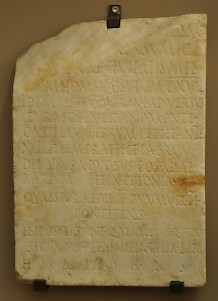Annexation
Roman-Jewish Wars: name of several military engagements between the Roman Republic (later: Empire) and various groups of Jews between 63 BCE and 136 CE.
Annexation of Judaea
When king Herod the Great died in 4 BCE, the Roman emperor Augustus divided his kingdom between his three sons. Herod Antipas was to rule Galilee and the east bank of the Jordan as a tetrarch until 39 CE; Philip was to be tetrarch of the Golan heights in the north-east, which he held until 34 CE; and Herod Archelaus became the ethnarch of Judaea, which included Samaria in the north and Idumea in the south. Archelaus ruled so badly that the Jews and Samarians unitedly appealed to Rome to request that he should be deposed. In 6 CE, Archelaus was banished to Gaul. Judaea became an autonomous part of the Roman province Syria, ruled by a prefect.

The Syrian governor Publius Sulpicius Quirinius was ordered to organize the taxation of the new prefecture. Until then, taxes had been paid in kind. However, during the census which Quirinius organized, the inhabitants were required to declare their property in money.note
There are no indications that the Roman money taxes were higher than the taxes they replaced; this would have been impossible, because under the old tax decree the tax rate had already been 19,3% - extremely high in any agrarian society. (In 17 CE, a Jewish embassy appealed to the emperor Tiberius for a reduction in the tribute of Judaea.)
However, taxes in money were more onerous than taxes in kind, because a farmer had to borrow in case of a poor harvest. Besides, any Roman coin would bear an image of the goddess Roma or a legend saying that the man represented was the divine emperor: a violation of at least two of the ten commandments.
Not surprisingly, the Jewish peasantry was unhappy. The high priest Joazar, however, was able to convince almost everybody that they should cooperate with the new authorities, since the alternative would be the return of the detested king Herod Archelaus. But there remained some resistance. A Pharisee named Zadok and a scribe from Galilee named Judas of Gamala said that this taxation was equivalent to the introduction of slavery, and exhorted the Jews to assert their liberty. Their program was simple: God was Israel's only lord, and it was blasphemous to pay tribute to anyone else - including the Roman emperor. If they revolted, the Jews would find God as their zealous helper.
It is unclear what happened next. The Jewish historian Flavius Josephus writes that "men received their teachings with pleasure, and the plot to strike boldly made serious progress".note That there were disturbances can be deduced from a remark in the Acts of the apostles, where it is implied that Judas' band of followers was defeated and that Judas was killed (Acts 5.37). The revolt is absent from the catalogue of armed interventions by the Syrian governor of the Roman historian Tacitus;note it was not necessary to send the legions, which means that the rebellion cannot have been widespread.
However, the revolt made a deep impression. Writing almost a century after the events, the aristocratic author Flavius Josephus commented that this revolt caused a change in the ancestral constitution. No longer were the peasants listening to those who had always been their leaders; in Josephus' view, class war and faction strife had brought upon the Jews the destruction of Jerusalem and its Temple.
All sorts of misfortunes sprang from these men, and the nation was infected with this doctrine to an incredible degree. One violent war came upon us after another, and we lost our friends, which used to alleviate our pains. There were also very great robberies and murder of our principal men. This was done in pretense indeed for the public welfare, but in reality for the hopes of gain to themselves; whence arose seditions, and from them murders of men, which sometimes fell on those of their own people (by the madness of these men towards one another, while their desire was that none of the adverse party might be left), and sometimes on their enemies. Famine also came upon us, and reduced us to the last degree of despair, as did also the taking and demolishing of cities; nay, the sedition at last increased so high, that the very temple of God was burnt down by their enemies' fire. Such were the consequences of this, that the customs of our fathers were altered, and such a change was made, as added a mighty weight toward bringing all to destruction.note
Flavius Josephus probably exaggerates, because he tries to link the Zealots that fought in the war of 66-70 to the teachings of Judas the Galilean sixty years earlier, while there was a period of tranquility in between. However, the remark makes proves that the revolt made a lasting impression. The Romans were impressed too; as far was we know, no governor ever attempted a census again.